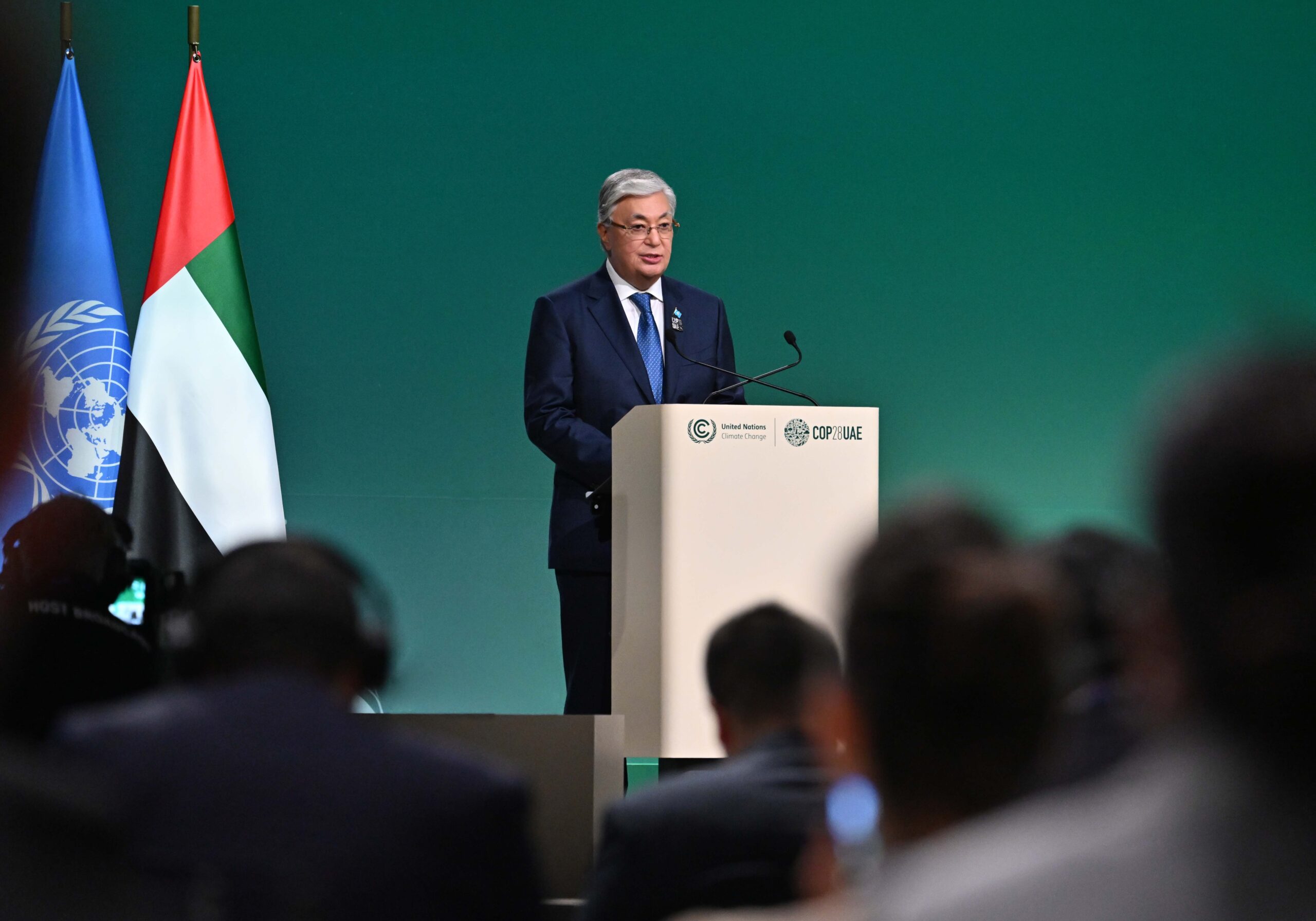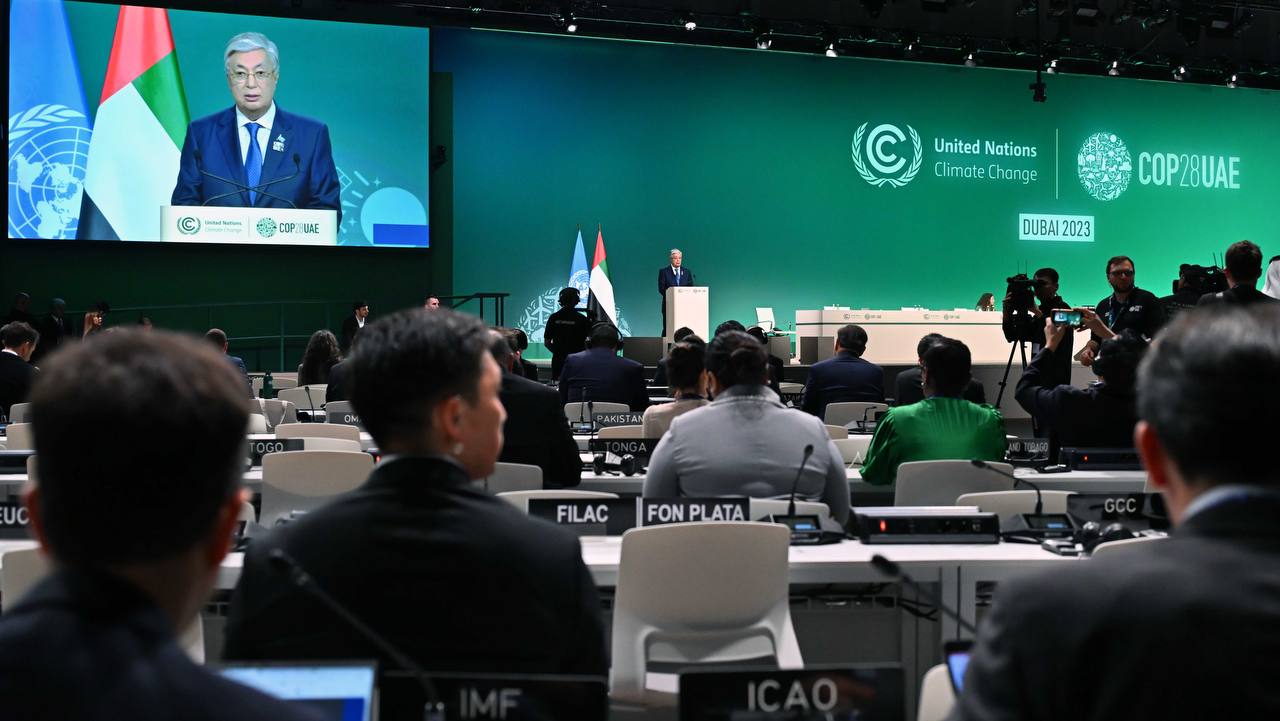ASTANA – President Kassym-Jomart Tokayev conveyed Kazakhstan’s strong commitment to addressing global climate challenges and outlined key initiatives during the Conference of the Parties of the United Nations (UN) Framework Convention on Climate Change (COP28) on Dec. 1 in Dubai, the United Arab Emirates (UAE), the Akorda press service reported.

President Tokayev announced Kazakhstan’s decision to join the Global Methane Pledge during COP28 on Dec. 1. Photo credit: Akorda.
Tokayev drew attention to the critical impact of climate change on almost half of the world’s population, particularly in vulnerable regions such as small island developing states, landlocked developing countries, and least developed countries.
Persistent geopolitical instability and energy insecurity also complicate efforts to maintain focus on the climate agenda, Tokayev noted, affirming Kazakhstan’s full support for the urgent UN call for concrete actions to safeguard the environment for future generations.
The President highlighted that Kazakhstan became the first country in the region to ratify the Paris Agreement and adopt the 2060 Carbon Neutrality Strategy. He mentioned the country’s new Environmental Code, which aims to facilitate the comprehensive adaptation of green technologies in almost every sector of the national economy.

President Tokayev said Kazakhstan plays critical role in generating carbon-free power globally, as a leading exporter of uranium, accounting for 43% of the world’s supply. Photo credit: Akorda.
With enormous potential for wind and solar energy and green hydrogen production, Kazakhstan will continue to work closely with partners to unlock these opportunities, Tokayev assured.
As a leading exporter of uranium, accounting for 43% of the world’s supply, Kazakhstan plays a critical role in generating carbon-free power globally.
“Indeed, as the world decarbonizes in the coming decades, critical minerals, including rare earths, will become essential. Kazakhstan is ready to become the main supplier of these transition minerals,” the President underscored.
Emphasizing the country’s support for private green initiatives, Tokayev cited Kazakhstan’s Packers Association, which works on projects to eliminate plastic waste, contributing to environmental protection.
“I think it is principled and fair to avoid requiring developing economies to sacrifice their national progress and modernization in the pursuit of climate protection,” he opined, saying that these goals should go hand in hand and reinforce each other.
Tokayev announced Kazakhstan’s decision to join the Global Methane Pledge, recognizing the reduction of methane emissions as the fastest way to slow global warming.
He added that the country is also solving the massive coal problem by implementing the region’s first Just Energy Transition Partnership.
Tokayev called on international partners to provide concrete support for these initiatives and urged an expansion of commitments to increasing climate finance.
“Even if we manage to limit global temperature rise to 1.5 degrees by 2050, Central Asian countries will still face a temperature rise of up to 2.5 degrees. This will lead to water shortages, extreme heat, desertification, and extreme hydrological events,” Tokayev stressed, acknowledging the inevitability and necessity of adaptation measures.
Next year, Kazakhstan will take over the chairmanship of the International Fund for Saving the Aral Sea, once the world’s fourth-largest inland body of water. Tokayev called on partners to allocate more funds to solve this issue.
The President informed that Kazakhstan and France will co-chair the first thematic One Water Summit on the sidelines of the next session of the UN General Assembly.
Tokayev invited participating states to the Astana International Forum in June 2024, a dialogue platform for continued focused cooperation on pressing climate-related issues until COP 29.
Kazakhstan will also host a Regional Climate Summit in 2026 under the auspices of the UN to give impetus to climate action in Central Asia, the President said, emphasizing the global nature of the climate emergency and the need for collective action and cooperation to address the crisis.


